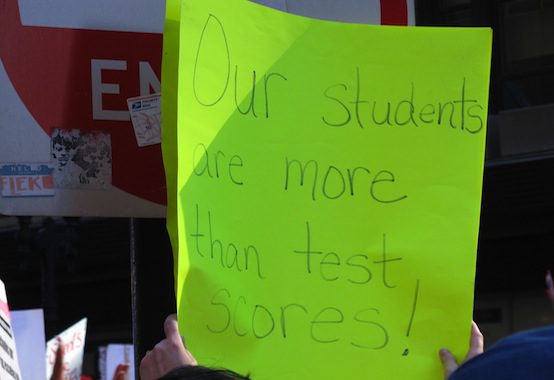Autonomy or Accountability – The Education Reform Dilemma

I’m of two minds about the Chicago teachers’ strike.
On the one hand, it strikes me as bizarre that the Chicago teachers are striking when, according to reports, the money items have largely been agreed to. From both a substantive and a public-relations perspective, it seems crazy to go to war over the details of a teacher evaluation system.
Moreover, with municipal and state finances in the state they are in, across the country the question public sector unions are facing is: accept givebacks deeper than they’d like, or accept layoffs larger than they’d like. I understand that unions are in the business of protecting their members’ interests, but I don’t understand why that seems so often to be expressed as a preference for layoffs over other givebacks.
But on the substance of the main issues in dispute, I’m not so fully in Rahm Emanuel’s column.
The two issues are: the procedure for re-hiring after layoffs, and the procedure for evaluating teachers. The union wants laid-off teachers automatically recalled when hiring resumes. The mayor wants them to reapply. And the mayor wants to implement a teacher evaluation system heavily weighted toward the results on standardized tests, while the union is resisting this.
I’m with the mayor on the first point. I understand their objection – basically, if laid off teachers need to reapply, rather than automatically being recalled, the mayor could use layoffs to cull teachers he wants to get rid of, bypassing the usual procedures that would provide for a grievance to be filed, and so forth. I understand it – but that’s a feature, not a bug. I want the administration to be able to wring efficiencies out of the teaching pool, and the ability to get rid of people you want to get rid of is absolutely indispensable.
On the second point, though, the experience of New York has not made me sanguine about the efficacy of this kind of evaluation system being implemented across a school system. What’s happened in New York is that the curriculum has been badly distorted by the imperative to teach to the test, an epidemic of cheating has broken out, and some of the most talented teachers have fled the system in frustration. In hindsight, it’s kind of obvious that a heavy-handed command-and-control approach to running a school system produced perverse incentives. That’s just what you would expect in any organization, public or private, that attempted to run everything from the home office.
It’s worth noting that high-stakes testing is not the primary tool high-performing charters use. Rather, they use frequent testing as an aid to pedagogy, and evaluate teachers on their performance not on a single high-stakes test but across a whole range of tests – and on how they responded to negative scores. It’s not that their evaluations are more subjective – though they can be. It’s that their evaluations are more fine-grained. And that’s because the evaluations are done by school leaders, who have the luxury of collecting a lot more data because they have a lot fewer teachers to evaluate than an entire school system.
A lot of ideas that were trendy in the school-reform movement a decade ago are on the outs now. Merit pay is another one. A lot of high-performing charter schools discovered that a bonus keyed to a complex metric didn’t incentivize higher performance – instead, it discouraged the substantial fraction of the staff who felt they “deserved” a higher bonus than they received, and who concluded the evaluation system is “unfair.” They got better results with a binary approach: you either earned your bonus, or you didn’t – and if you didn’t, that was basically a sign that you were on probation, likely to be fired if you didn’t shape up.
High-performing charters have developed a bunch of good ideas for improving schools, most of them very simple. The most important idea, though, is the relationship between autonomy and accountability. Without a measure of autonomy, there’s no way to innovate to meet an accountability measure. So what you wind up doing is focusing on the few levers you do have, and pushing them to the limit and beyond. In the public schools, that has meant throwing out all kinds of “non-core” activities and replacing them with test prep. Which is no way to improve the schools.
Unions would undoubtedly resist even more fiercely reform proposals that would, effectively, “charterize” the public schools – giving individual principals more autonomy to hire and fire, and putting the “accountability point” at the level of the school leader rather than the individual teacher. But that’s the model that high-performing charter schools actually follow.
Comments